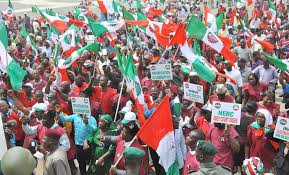APA – Lagos (Nigeria) Tens of thousands of protesters have been taking to the streets of major cities in Nigeria on Tuesday to protest the rising cost of living which to many has reached alarmingly unbearable proportions.
The country’s ports have also been crippled as maritime workers joined the strike action to pressure the government to act and save the economy.
The two-day nationwide protests ordered by the Nigeria Labour Congress (NLC) began on Tuesday morning with the members of the Nigeria Police Force providing security to ensure that the protests are not hijacked by hoodlums across the country.
The NLC had to call on their members and the general public for the planned protests after the last-minute effort by the Nigerian government on Monday night to prevent protesters venting their frustration against the biting economic hardship in the country.
In Lagos, commercial activities have been paralysed as other unions, such as the Nigerian Union of Teachers (NUT), The Nigeria Union of Local Government Employees (NULGE), National Union of Air Transport Employees (NUATE) among others have joined the protests.
The members of the NLC are expected hold a rally in Ikeja before heading to the Lagos State House of Assembly also in Alausa, Ikeja.
Meanwhile, there are reports of peaceful protests across the 36 states of the country including Abuja, the Nigerian capital city.
The nationwide protests by the NLC is to express the frustrations of Nigerians at the current nationwide hardship caused by anti-people policies and reforms of the government.
Since the new government led by President Bola Tinubu took over in May 2023, Nigeria has been going through worsening economic hardshipsblamed on the removal of petrol subsidies and the floating of the national currency the Naira.
The Naira is experiencing a free fall in its value against international currencies, distortion in the petroleum sector corruptly called “subsidy removal”.
The results of these policies are high cost of transportation, unaffordable prices of food and other commodities, job losses and ballooning joblessness, insecurity, absence of reasonable minimum national wage and a general atmosphere of despair and despondency.
GIK/APA


